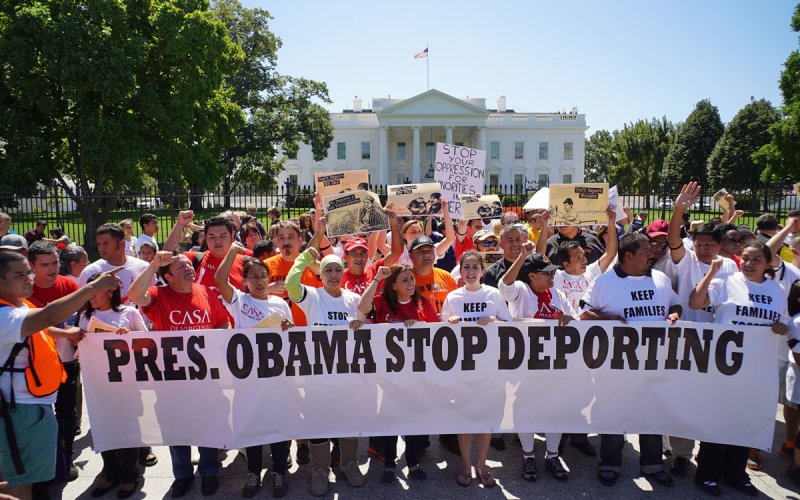
Conservatives and liberals both assume that the president will eventually halt the deportation of millions of illegal immigrants through an executive order. They’re wrong.
For the last several weeks, in Washington and the nation’s immigrant communities, the assumption was that President Obama would circumvent Congress and use his executive power to spare millions of illegal immigrants from deportation by offering them temporary legal status.
The assumption was wrong. As I’ve maintained for months, this rumored plan to overhaul the immigration system through an executive order is not going to materialize. Not after the November elections, and not at any point during this administration.
The details of exactly what Obama would do and how many people stood to get legal status were unsettled. But the message was clear: Obama was finally ready to keep a promise made long ago to deliver immigration reform—and primed to go it alone. The president said as much in late June, when he declared his frustration with congressional inaction on the issue and vowed to do whatever he could to fix the problem.
Both the left and the right pushed the idea that Obama would go around Congress and issue an executive order—albeit for different reasons.
On the left, immigration advocates, aided by the liberal print and broadcast media, wanted to believe the president would take action because they still hoped that Obama could be a champion for progressive causes, and because executive action would show up Republicans in Congress who had refused to take up the immigration bill passed last year by the Senate.
On the right, immigration restrictionists, with a helping hand from conservative talk radio, pushed the line that what they called “amnesty” was on the way because it played into the larger narrative that the federal government was overriding the will of the people. This helped rally the troops and raise funds for anti-immigration organizations.
There have been dozens of stories in the last few weeks suggesting that some sort of executive relief for the undocumented was just around the corner.
An August 9 editorial in The New York Times, titled “Mr. Obama, Your Move,” suggested that some kind of executive action was a done deal and then offered the president a roadmap: “The most obvious thing is to lift the threat of deportation from immigrants who should be the lowest priority for removal: those with citizen children, jobs, clean records and strong community ties. Some reports put the size of that group at four million to five million.”
Now, just a few weeks later, there is no need for roadmaps. The President and White House officials are signaling that any executive action will have to wait until after the November elections.
And wait, and wait. Here are seven reasons why we shouldn’t expect Obama to “go it alone” on immigration before or after Election Day:
— THE BACKLASH. Those who root for executive action by Obama always seem to forget the downside: the potential for ballot box retribution toward Democrats, including vulnerable Senate Democrats. According to the polls, many Americans are still uncomfortable with the idea of rewarding lawbreakers by letting them stay in the U.S. legally. If Obama legalizes millions of people this close to November, it’ll turn Election 2014 on its head and could flip the Senate to Republican hands. You can bet that Obama doesn’t want that on his head.
— THERE IS NO POLITICAL BENEFIT. The constituency most clamoring for executive action has already shown they expect little and will settle for nothing. Latinos have proven they’re a cheap date for Democrats, and willing to be fooled by Obama. In 2012, after he had already broken his promise to make immigration reform a top priority and deported 1.5 million people, Latino voters still gave him 70 percent of their votes. What’s the incentive to stick your neck out to please a group that is so easily pleased with nothing?
— LATINOS ARE DIVIDED. Obama may have already figured out that even Latinos aren’t of one mind on immigration reform. Cuban-Americans, Dominicans, and Puerto Ricans don’t care much about it; Mexicans and Mexican-Americans do. Many Mexicans aren’t citizens and can’t vote, and Mexican-Americans are divided—again. Some consider immigration reform a deal breaker for supporting Obama and Democrats, others don’t.
— OBAMA IS A RESTRICTIONIST AT HEART. Democrats are split. Some support immigration reform because it would help immigrants, while others oppose it because they think flooding the job market with millions of able-bodied workers who work cheap would hurt American laborers. Obama is in the second camp. In 2008, in Los Angeles, during a debate with Hillary Clinton, Obama framed the problem as one in which employers exploit the system by hiring illegal immigrants and thus lower wages for U.S. workers. Now, as president, he is not interested in legalizing the undocumented and creating more competition for U.S. workers.
— OBAMA’S RELATIONSHIP WITH AFRICAN-AMERICANS WOULD SUFFER. Parts of Obama’s most loyal constituency are not pleased with the fact that the president didn’t go to Ferguson, Missouri, during the protests. And they’re furious that Obama asked Congress for $3.7 billion in aid to care for thousands of unaccompanied minors from Central America but hasn’t done the same on behalf of those who live in predominantly black areas that are suffering. If Obama adds to the misery by offering legal status to millions of undocumented immigrants, many of whom will then compete with African-American workers for scarce jobs, the relationship will be permanently damaged.
— OBAMA HAS NEVER CARED ABOUT IMMIGRATION REFORM. Obama’s record in the Illinois State Senate was woefully thin when it came to advancing issues of concern to Latinos including immigration. United Farm Workers co-founder Dolores Huerta said so when, in 2008, she famously called out Obama as a “Johnny come lately” to Latino concerns. On immigration, as a freshman senator in 2006, Obama helped defeat an immigration compromise bill by authoring “poison pill” amendments intended to kill the bill by peeling off Republican support. While running for president, he promised Latinos that he would make immigration reform a top priority and later broke that promise. Obama cared about health care reform, and it got done. He doesn’t feel the same way about immigration.
— AN ABOUT-FACE ON USING EXECUTIVE POWER WOULD BE CLUMSY. As early as spring 2010, Obama met with “stakeholders” at the White House who pressured him to stop deportations and give legal status to DREAMers. Obama resisted that call for nearly five years, insisting that he didn’t have the authority under the Constitution. Repeatedly, he insisted that he wasn’t “a king” and that Congress must act. Now, if Obama changes course and does the very thing that he has been insisting he doesn’t have the power to do, it’ll be awkward and problematic. The smart move is to do what he has been doing for his entire presidency and continue to kick this can down the road.
And that’s exactly what Obama is going to do. The November elections will come and go, and there will be another set of excuses for why the president can’t use executive power to improve the lives of millions of people. Then another.
Immigration reformers like to say that the price of doing nothing to fix the system is high. But, for this president, the price of doing something is even higher.















